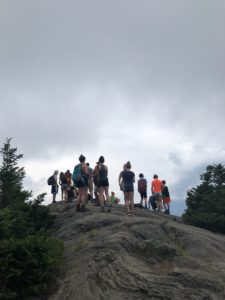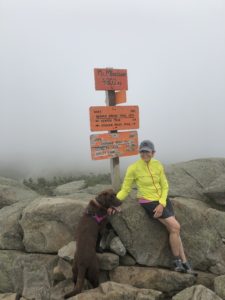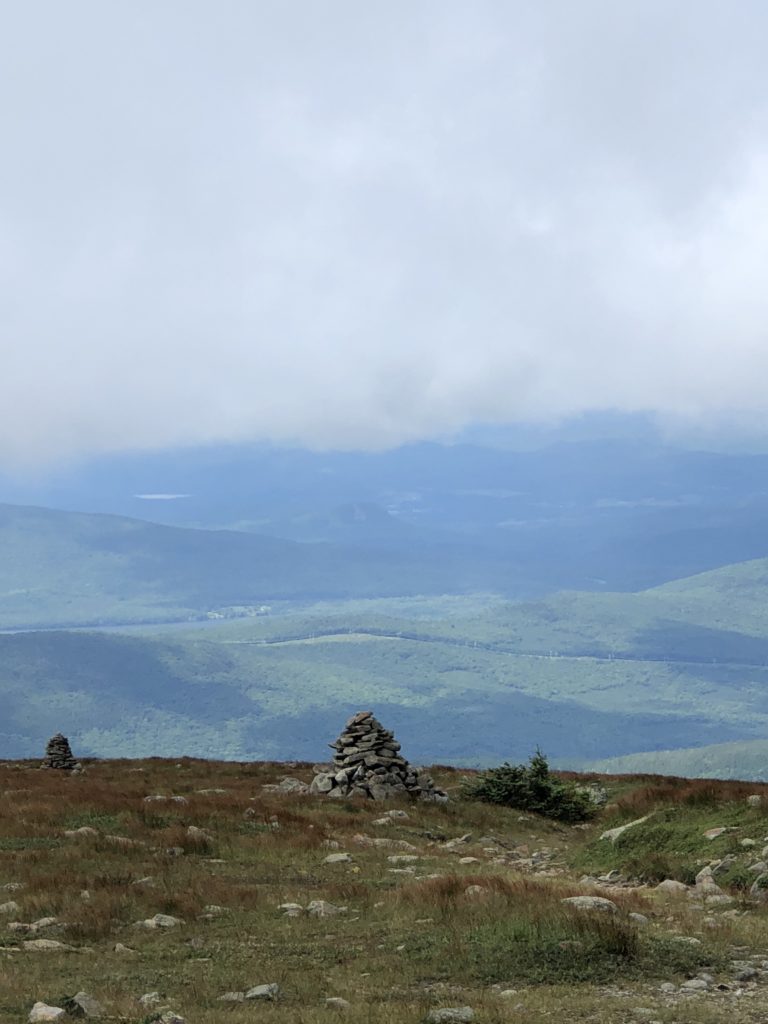
Always a popular place to pause – the top. Stowe Pinnacle Trail
Recently I was asked what food and hydration a hiker might need for a day hike. Note, I am not a licensed nutritionist or dietician, but from working with several, plus coaches and experience with endurance sports, here’s what I recommend: Keep it simple. You don’t need as much food as you might think. You are hiking not picnicking. (Besides, you have to pack it in and pack it out and be sure that what you take does not spoil!)*
Much depends on you as an individual – your weight, your metabolism, any special dietetic issues, etc. Because you should fuel for energy, strength, stamina and endurance, a variety of energy producing and sustaining foods are recommended.
You can calculate a very basic average metabolism by adding a zero to your weight. For example, my weight fluctuates between 110 and 114 so I assume that my basic needs are met by consuming 1100-1140 calories a day – and by basic I mean breathing, heart pumping, etc. Then I add in what I consider to be appropriate calories for whatever energy I use in my daily life as well as whatever I may use in deliberate designated exercise. (I don’t count calories, just ballpark it.) As a rule of thumb I assess that I need about 100 calories a mile walking, 100-300 an hour cycling or hiking fairly aggressively. I pack very small snacks to get the job done as I do not want to waste my body’s energy production on digestion!  I prefer dates, nuts, raisins, trail mix, ok and yes a Clif bar that I always share with my pup, Sophie. I do not promote trendy engineered foods such as power drinks and bars, but rather support “real” foods. I do think that part or all of your drinking water should contain some electrolytes (I prefer Skratch https://www.skratchlabs.com/collections/drinks/products/sport-hydration-drink-mix?gclid=CjwKCAjwmZbpBRAGEiwADrmVXhtL_Wt_SWL_brlBskRWrAyTwOGxdUjb1UfUquBWSHrhhaly2kNGMBoCIcAQAvD_BwE&variant=42591625797or Tailwind https://www.tailwindnutrition.com) and in fact, sipping on Tailwind along the way eliminates a need for food at all unless you get hungry! Oh and Lara is an excellent choice for a bar. Avoid sugary stuff as that will drop you too soon.
I prefer dates, nuts, raisins, trail mix, ok and yes a Clif bar that I always share with my pup, Sophie. I do not promote trendy engineered foods such as power drinks and bars, but rather support “real” foods. I do think that part or all of your drinking water should contain some electrolytes (I prefer Skratch https://www.skratchlabs.com/collections/drinks/products/sport-hydration-drink-mix?gclid=CjwKCAjwmZbpBRAGEiwADrmVXhtL_Wt_SWL_brlBskRWrAyTwOGxdUjb1UfUquBWSHrhhaly2kNGMBoCIcAQAvD_BwE&variant=42591625797or Tailwind https://www.tailwindnutrition.com) and in fact, sipping on Tailwind along the way eliminates a need for food at all unless you get hungry! Oh and Lara is an excellent choice for a bar. Avoid sugary stuff as that will drop you too soon.

Take a break – even if you don’t think you need it!
Proper hydration is a must. The onset of crampiness, headaches, fatigue and a multitude of other symptoms simply herald the need to hydrate – not huge gulps that empty a 32 oz bottle, but sipping regularly along the route. Camelback’s provide a perfect solution to this imperative. Again, however, depending on the heat/sweat situation, length of hike, and intensity of the climb, consider adding electrolytes in an individually appropriate amount to your water.
But let me go back a bit. I have had it hammered into my head that the best way to fuel for an event or competition is to eat well all year long! When planning a hike I strongly suggest that what you eat the day before is important – keep it balanced, nutritionally dense but relatively small in volume, easily digested and hopefully complete all necessary elimination before leaving for your day hike! (You DO NOT want GI issues on the trail – a sure way to spoil a hike.) Be sure to drink plenty of fluids the day before and morning of your hike. (And be sure to pee at the last possible second! Note – there are rarely outhouses along the route and if there are, they are usually not attractive. The same “pack out” rule applies to you with respect to toilet tissue etc. You must bury any waste and are, in fact, urged to carry a trowel. So, if you can get the job done ahead of time ….)
Breakfast? Again, keep it light but power packed – oatmeal, or eggs and toast, maybe, a Smoothie if you’re a Smoothie person … you get the idea. Fruit is great for energy on the trail or before, but be careful of it’s effect on your body as well as perishability in a pack. (do you really want to carry that banana peel back down?)
And don’t forget that some healthy recovery fuel within an hour of your hike is super important. Again, it does not need to be steak and potatoes – perhaps a half pb and banana sandwich? The proverbial chocolate milk works (ever tried chocolate almond milk?!) or stopping for a reward treat on your way home. (think about 300 calories) Your recovery food helps your body do just that – recover from the stress of your hike and leave you wanting to go out and up again!
I hope this helps. Please do some research and experimentation on your own. If you have a sports nutritionist in your area, it’s well worth the time and cost to develop a personalized plan. Hopefully you are on your way to many enjoyable hiking experiences so make each as pleasant and rewarding as possible by fueling and hydrating well.
*Leave no trace
- Plan Ahead and Prepare
- Travel and Camp on Durable Surfaces
- Dispose of Waste Properly
- Leave What You Find
- Minimize Fire Impact
- Respect Wildlife
- Be Considerate of Other Visitors
And for those of us hiking in Vermont, The Green Mountain Club is a go-to site for all trails Vermont! https://www.greenmountainclub.org
I found this excellent resource. Please give it a look – https://www.gore-tex.com/blog/what-to-eat-and-drink-before-during-after-a-day-hike
